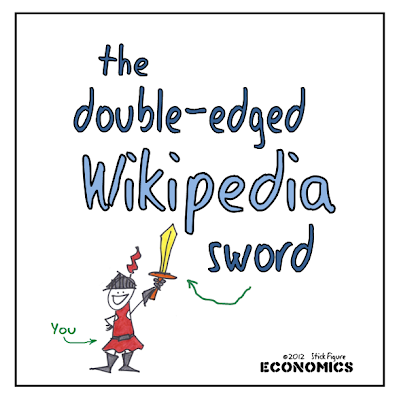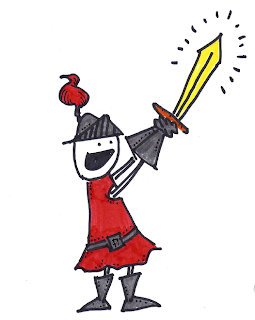Sunday, June 3, 2012
My Philosophy on Wikipedia
Wikipedia, as a whole, rocks my face off. I could probably spend entire days on it, looking up stuff. In fact, this panel from one of my favorite webcomics, xkcd, pretty much sums up what happens when I haplessly venture over to Wikipedia's dark side.
In my opinion, Wikipedia is an excellent tool to use to familiarize yourself with a topic.
Thank god for Wikipedia. Many a sleepless night has been thwarted by its impressive powers of encyclopedic instruction. There is nothing like a quick Wikipedia check to elicit a soothing "oh, so THAT'S what Professor Dingleberry was talking about when he mentioned fiscal policy..."
Wikipedia is collaboratively edited, and therein lies its double-edged sword. Anyone who cares about a particular topic can edit it. This implies that popular topics will have more editors, which lead to more editing and more accuracy. Hooray! The power of the market prevails!
Unpopular topics, however, won't have as many editors. Idiots and/or people with personal agendas can edit these topics and will encounter fewer arguments about their contributions. It's possible that with these topics, some jerkwad could post incorrect information, and nobody would care to say, "hey, wait a minute.....you're WRONG" until it's too late and thousands of tired students had already used the (wrong) information in a paper due in 4 hours.
The other thing that you need to remember, as a tired and desperate student, is that as stupid as Professor Dingleberry might seem, he's probably read the Wikipedia page on fiscal policy. In fact, he might have written or edited some of it himself. So if you slip up and write your whole paper based on the one Wikipedia article when he asked for 4 or more sources, you're pretty much slitting your own throat.
Again, Wikipedia is an excellent tool for getting familiar with a topic. It even lists more specific sources under "External Links" at the bottom of the page. These links could well be your lifeline. They are the connection to the meat and potatoes of your research.
It's true. In the eyes of your professor, bothering to click on a link that Wikipedia referred you to, and then using the information you found from that link in your paper*, could catapult you from the mediocre masses to the elite, successful paper-writing few.
See? Taking that extra step is easy and (relatively) painless.
And THAT'S why Wikipedia is such a double-edged sword....so incredibly useful and yet so dangerous.
So wield the Wikipedia sword with care! And for god's sake, don't use it to plagiarize.
*(And always remember to properly cite your sources!)
Labels:
college,
high school,
research,
wikipedia
Subscribe to:
Post Comments (Atom)






No comments:
Post a Comment